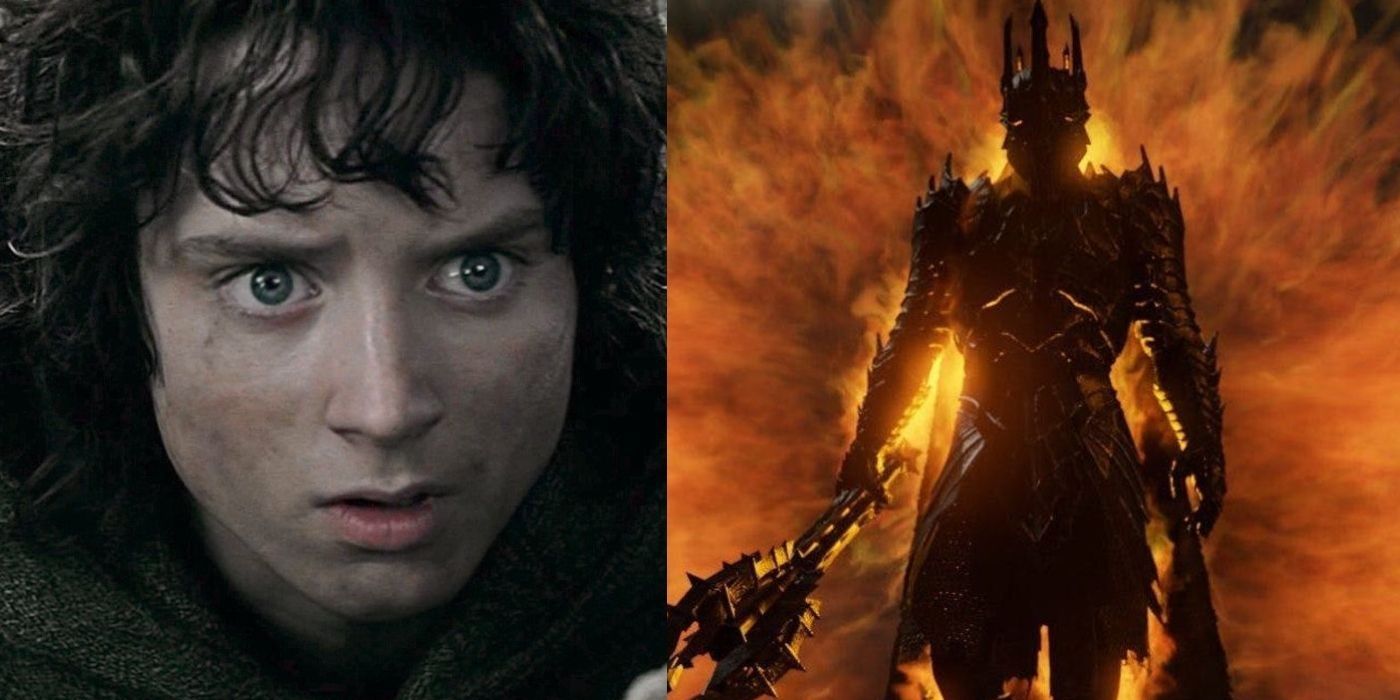The whole story of Lord of the Rings is leading up to one thing: Frodo Baggins (Elijah Wood) destroying the Ring in the fires of Mount Doom. However, when Frodo, Samwise Gamgee (Sean Astin), and Gollum (Andy Serkis) arrive at Mount Doom, Frodo is no longer able to resist the power of the One Ring. He and Gollum struggle for it and Gollum and the Ring end up going into the fire. This is, at least, how it happens in the Lord of the Rings movies. The books are somewhat different. However, the only reason Gollum was there is because Frodo let him live. So did the Hobbit succeed in his quest to destroy the Ring, after all? Or was it entirely out of Frodo's hands at that point? Did a Middle Earth higher power intervene? Or was it as Gandalf said that Gollum had a part to play in the quest?
To understand the answers to these questions, it is crucial to understand the story that the Lord of the Rings movies are telling. The story, in this case, is a bit darker than the books' version, but still has mostly the same bittersweet ending. The story begins with Frodo being a pretty typical Hobbit in the Shire, except for the fact that he's Bilbo's nephew, or whatever they are to each other. Frodo goes from being quite innocent to learning about the darkness outside of his safe home quite quickly once he gets the Ring. At least in the Lord of the Rings movies. Gandalf tells him to keep the Ring safe and to keep it a secret. After doing some research Gandalf returns, and after confirming that he does indeed possess the One Ring, Gandalf tells Frodo to get started on his journey. The journey even to Rivendell is not without its dangers. Frodo and his companions Sam, Merry (Dominic Monaghan), and Pippin (Billy Boyd) are hunted by Nazgûl. Thanks to Aragorn (Viggo Mortensen), Arwen (Liv Tyler), and Elrond (Hugo Weaving)'s help, Frodo and his friends manage to survive.
RELATED: Why Did Frodo Have To Leave Middle Earth At The End Of Return Of The King?
Then comes the Council of Elrond when Frodo officially states that he will take the Ring to Mount Doom and destroy it. This is when the Fellowship of the Ring begins. Of course, it doesn't last forever. Frodo and Sam eventually break away from the rest of the Fellowship and head to Mordor on their own. Yet while the Fellowship lasts, at least Frodo has some measure of protection against the darkness. He not only has Aragorn and Boromir (Sean Bean), who are both accomplished fighters. He also has Gandalf's magic and every bit of loyalty and bravery that his Hobbit friends possess. Perhaps Frodo's struggle was inevitable. As time goes on, he becomes more and more isolated, more and more burdened by the Ring. Although he does have Sam, which helps him to not give up hope completely, it is definitely hard for Frodo to manage the pull of the Ring.

He does not have the Ring for as long as his relative Bilbo (Ian Holm) did, and definitely not as long as Gollum did. Yet when Frodo possesses the Ring, Sauron is at the peak of his power and is actively looking for his Ring. That can only add to Frodo's struggle. When Frodo finally gives in to the power of the Ring, does he truly fail? Or does it, in a way, make some sense? And since Gollum is there to play a role in the Ring's destruction solely because of Bilbo's –and Frodo's– mercy, did the Hobbit really fail? Or did he truly succeed through his kindness and compassion? Frodo's story is bittersweet, yet it is not wholly tragic. Frodo is a true protagonist, one that Lord of the Rings fans can look up to. So...why does he give in to the Ring at the end?
Well, it's a definite possibility that no one could have resisted the Ring at that point. After carrying it for a while, when Sauron is extremely powerful and actively searching for the Ring. To resist the Ring would take more willpower than even Frodo possesses. Frodo might have truly resisted the Ring for as long as he could have. However, did he fail on his quest? Definitely not. If Frodo had slain Gollum when he had a chance to, many Lord of the Rings fans would have understood. After all, Gollum is a sneaky creature. No one could blame Frodo for wanting him out of the picture. However, that is not what Frodo does.
He does not harm Gollum. Instead, he spares the creature. He is even kind to him. And that, in the end, is what saves Frodo and his quest. If Frodo hadn't been compassionate to Gollum, Gollum wouldn't be there in the first place. Frodo felt for Gollum and hoped that by showing him kindness, Gollum would be kind in return. Of course, Gollum was possibly too far gone for the Ring at that point. Yet Frodo was kind anyway. And that is, perhaps, what the Lord of the Rings movies want to get across. Be kind, even to those who make it difficult. Because one can never know what part they might play in one's life.

Just as Gollum inadvertently helped Frodo's quest succeed, even the most difficult of people might be a help in the end. One never knows. It is his kindness to Gollum that makes Frodo's quest succeed after all. It might be a Middle Earth higher power intervening, but it might just be as Gandalf said: Gollum had a part to play. And he wouldn't have been able to do so if it hadn't been for Frodo's mercy.

